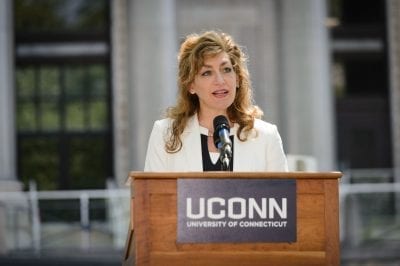This past week, UConn President Susan Herbst was part of a coalition of university presidents who took an important step toward achieving an equitable, environmentally conscious future by signing UConn on to the Second Nature’s Call to Action and Guiding Principles for Accelerating Equitable and Just Climate Solutions. Below is the statement she released explaining the role of UConn in creating a future that is healthy and safe for everyone.

Susan Herbst:
As a Land Grant and Sea Grant institution, the University of Connecticut has always felt a special responsibility to set high standards and uphold strong principles on the ways in which we understand and protect our environment both locally and globally.
For these and many other reasons, we wholeheartedly endorse the imperatives articulated in Second Nature’s Call to Action and Guiding Principles for Accelerating Equitable and Just Climate Solutions, which were announced recently at the 2019 Higher Education Climate Leadership Summit in Tempe, Arizona.
These principles remind us that universities have not only the power to motivate change and the expertise to offer innovative solutions, but also the responsibility to ensure that those solutions are equitable and developed in collaboration with the people most impacted.
That responsibility is especially challenging when it comes to climate change because of the distance between our actions here and now, and their consequences, which are often far removed in time and space.
It’s our duty as global citizens to adjust behaviors today for carbon mitigation and resilience preparation that will primarily benefit future generations, or vulnerable populations located somewhere else around the world. To this point, Second Nature’s Guiding Principles advise us to think globally; we must continuously review and refine our campus climate action plans to ensure that our goals and strategies reflect the best available science about the effects of climate change.
As a state flagship, public research university, UConn‘s mission has always included public service. We frequently partner with state and local governments and strive to be engaged leaders in our community. Second Nature’s Guiding Principles urge us to extend this engagement to the global community. In the context of climate change, we can do this by accounting for how the long-term costs of our institutional activities might “negatively impact people and the planet, and strive to measure, internalize, and avoid these costs to the greatest extent possible.”
The first step is raising awareness about the underlying science of global warming and collectively accepting our share of responsibility for its harmful effects, which are already occurring in places far removed from our nation’s campuses. This includes subsistence farms in North Africa wiped out in recent years by historic droughts, entire coastal communities in Pacific island nations displaced by sea level rise and flooding, and essential drinking water supplies threatened by receding glaciers in the Himalayas.
Informed by this knowledge and driven by basic human decency, the next step of higher education institutions should be recognizing the urgent needs of the world’s most vulnerable populations by accelerating our climate strategies.
UConn has historically been a leader on this front, and we continue to reaffirm our efforts to this end. We recently adopted an environmental literacy general education requirement that will ensure our students graduate from UConn with a grasp of important, intersectional environmental issues including climate change.
UConn is also an active agent in local climate adaptation projects, notably through the University’s Connecticut Institute for Resilience and Climate Adaptation (CIRCA), which works with economically disadvantaged communities to improve their climate resiliency.
In 2017, we joined a multi-sector coalition of American businesses, state and local governments, NPOs, and colleges and universities by signing the “We Are Still In” pledge, reaffirming our commitment to the goals of the 2015 Paris Agreement.
Last fall, we joined 17 other major research universities in the University Climate Change Coalition (UC3), sharing our expertise in order to accelerate solutions to global warming. And, for the past four years, our UConn@COP program has brought a delegation of students to the U.N.’s annual international climate summit for an immersive, hands-on learning experience, with the goal of developing future leaders in climate science and policy.
This year, UConn’s Sustainability Office will meet with departments and stakeholders across campus, including at a student summit scheduled for next month, in order to update our strategic goals and metrics for climate leadership through 2025. This is the next five-year milestone in our long-term Climate Action Plan. It’s also the perfect opportunity to utilize Second Nature’s Guiding Principles as a more global and equitable lens for reviewing our progress and envisioning more impactful strategies toward a carbon-neutral campus.